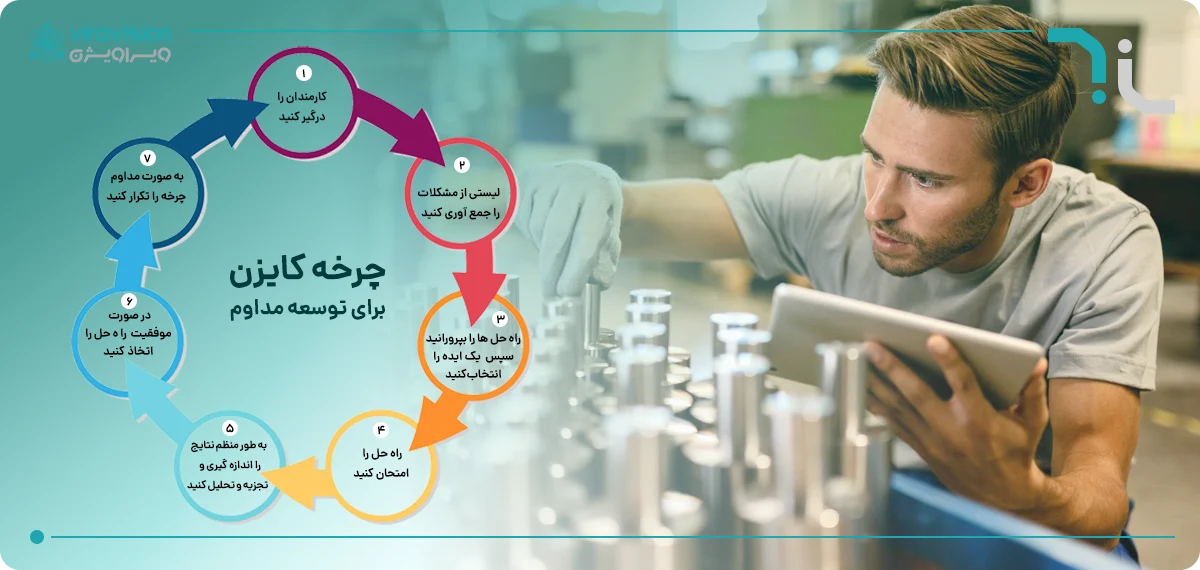Kaizen in Quality Management: Continuous Improvement Principles

The concept of Kaizen in quality management means continuous improvement, which plays a significant role in organizational processes. This approach, rooted in psychology, emphasizes gradual and continuous changes, helping organizations implement performance improvements in a sustainable and systematic way across all organizational levels.
Kaizen principles are based on the participation of all members of the organization and continuous process improvement. The Kaizen steps start with identifying problems and analyzing processes in detail, followed by implementing gradual changes and evaluating performance.
These steps enable organizations to continuously enhance the quality of their products and services and achieve long-term goals. Since Kaizen in quality management emphasizes ongoing improvement, organizations that implement Kaizen principles can achieve tangible and sustainable results aligned with organizational growth and transformation.
Kaizen Principles in Psychology: Establishing Continuous Improvement in Human Behavior
In psychology, Kaizen refers to gradual and continuous changes in human behavior that can have profound effects on personal and professional life. Kaizen principles are based on the idea that small, continuous improvements over time ultimately lead to significant changes.
This approach helps individuals avoid sudden changes or high pressures and instead achieve personal growth and behavioral improvement by accepting small, incremental changes. The Kaizen steps in psychology include identifying ineffective behaviors, making small and feasible changes, and evaluating the effects of these changes.
The concept of Kaizen in quality management is built on the same principles, where continuous improvement in processes and individual behaviors can help increase overall organizational quality. By applying Kaizen principles in psychology, individuals can achieve sustainable behavioral changes, leading to improved performance and greater satisfaction in personal and professional life.

Kaizen Concept in Quality Management: From Principles to Successful Implementation Steps
Kaizen in quality management means gradual and continuous improvement applied in organizational processes to enhance the quality of products and services. Rooted in psychology, Kaizen emphasizes small and continuous changes. Here are key steps for successfully implementing Kaizen in quality management:
- Understanding Kaizen principles: The first step in implementing Kaizen in organizations is to understand its principles, including gradual changes, employee participation, and continuous process improvement.
- Identifying inefficient processes: Using data analysis and process review, organizations should identify weaknesses and problems to focus on improving them.
- Implementing small changes: According to Kaizen principles, changes should be implemented gradually and incrementally to avoid putting excessive pressure on the system.
- Employee participation: One of the Kaizen principles in psychology is involving all members of the organization in improvement processes. This ensures employees feel more responsible.
- Continuous evaluation and feedback: For Kaizen to succeed, continuous evaluation and feedback from teams and managers are essential to maintain ongoing improvement processes.
Successfully implementing Kaizen in quality management enables organizations to continuously move toward improvement and achieve measurable results in quality enhancement.
Kaizen Steps in Quality Improvement: From Analysis to Action
Kaizen steps in quality improvement help organizations enhance process and product quality through gradual and continuous changes. These steps include detailed analysis, implementing small changes, and continuous evaluation. A summary of the Kaizen steps in quality improvement:
- Analyze the current state: The first step in Kaizen is identifying problems and analyzing existing processes to precisely detect weaknesses.
- Examine root causes: Tools like cause-and-effect analysis are used to identify the main causes of problems, not just the symptoms.
- Set improvement goals: After identifying problems, organizations should define specific quality improvement goals to increase efficiency and reduce waste.
- Implement gradual changes: According to Kaizen principles, changes should be small and incremental, easy to implement and evaluate without putting excessive pressure on the system.
- Evaluation and feedback: After implementing changes, processes should be continuously evaluated, and feedback should contribute to ongoing improvement.
By applying these Kaizen steps in psychology and quality management, organizations can continuously implement small changes in processes, leading to significant improvements in performance quality.

Kaizen Principles: Keys to Improving Organizational Performance from a Psychological Perspective
Kaizen principles, as a philosophy of continuous improvement, are very important in psychology and quality management. These principles are based on gradual changes and active participation of individuals in improvement processes. From a psychological perspective, Kaizen helps individuals gradually improve their behaviors by accepting small changes.
In organizations, Kaizen principles can enhance overall performance, increase motivation, and improve employee participation. One of the core principles is accepting gradual changes, which allows individuals to break complex changes into smaller parts and move steadily toward improvement. Employee participation is another key principle of Kaizen, playing a critical role in the success of improvement processes.
Organizations should give employees the opportunity to identify problems and propose solutions. Kaizen steps, from analyzing the current situation, identifying problems and root causes, to implementing small changes and continuous evaluation, help improve organizational performance. Overall, Kaizen in quality management is a continuous improvement approach that impacts processes and increases employee motivation and satisfaction.

Kaizen Concept in Psychology and Quality Management: 5 Steps for Organizational Transformation
Kaizen in psychology and quality management is recognized as an approach for continuous and gradual improvement in organizations and individual behaviors. This process helps organizations consistently move toward quality enhancement and create positive changes in employee behavior. To achieve organizational transformation using Kaizen, there are five key steps:
- Identify challenges and opportunities: The organization should identify existing problems and weaknesses and examine improvement opportunities. This step is essential for prioritizing and allocating resources for change.
- Define clear and measurable goals: One Kaizen principle is that goals must be clear and specific, aligned with continuous improvement and achieving higher standards in organizational and individual performance.
- Create small, actionable changes: Large changes can cause resistance. Kaizen emphasizes small, gradual changes that can be easily incorporated into existing organizational structures.
- Involve all members of the organization: A key Kaizen principle in psychology is that all employees should participate in the change process, creating a sense of ownership and responsibility.
- Review results and ensure continuous improvement: Finally, through continuous evaluation and feedback, organizations can take corrective actions and maintain the path of ongoing improvement.
These Kaizen steps allow organizations to create transformations not only in work processes but also in employee behaviors, achieving sustainable growth.

Conclusion
In conclusion, implementing Kaizen in psychology and quality management can significantly improve organizational performance. By identifying problems, setting clear goals, and making gradual changes, organizations can continuously move toward quality improvement.
Active employee participation in this process not only enhances motivation and job satisfaction but also ensures changes are easily accepted within the organizational culture. Continuous evaluation and feedback help organizations implement necessary improvements and optimize processes continuously.
Kaizen is not only an effective management tool for improving product and service quality but also a management philosophy that enhances individual behavior and creates a collaborative and dynamic work environment. Ultimately, this approach helps organizations remain flexible and competitive in response to market changes and customer needs.
Further Reading:









